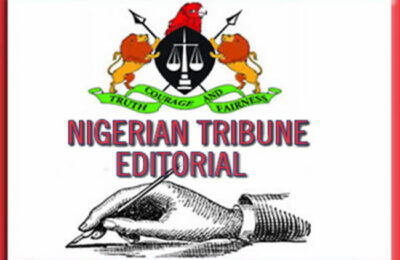
THERE is no doubt that the President Bola Ahmed Tinubu led government which came into existence on May 29, 2023 has made some impacts felt on the country’s aviation sector through moves so far made by the Minister of Aviation, Festus Keyamo.
It is no longer news that some of the actions already taken by the government through the minister is gradually restoring international confidence to the hitherto battered image of the country particularly its aviation sector where foreign investors had written off business transactions with the Nigerian airlines.

Such steps gave rise to the positive vibes gradually coming from leasing companies and aircraft manufacturers like Boeing and Airbus, now willing to collaborate with the Nigerian carriers.
Worthy of mention was the successful signing of the Cape Town Convention (CTC) Practices Directions by the Federal Government, which almost immediately gained international recognition with the Aviation Working Group, co-chaired by both Boeing and Airbus increasing Nigeria’s global rating from 49 to 70.5.
The signing of the CTC Practices Directions is the Irrevocable De-registration and Export Request Authorisation (IDERA), which governs aircraft repossession by creditors and lessors.
The goodwill from the international space continues as international aircraft lessors that initially avoided Nigeria like a plague have changed the narrative as they have invited the minister and the Nigerian airline operators to a high level meeting in the coming year where issues of providing support and financing for the local carriers will take the centre stage of discussion.
With these feats, there is no doubt that the Tinubu government is repositioning the sector for more global reckoning from next year.
However, while the government deserves accolades for this, so many issues that have been found to have contributed to the stagnation of the sector locally, despite various efforts are not being addressed by the government.
This brings to the fore once again the lack of constituted governing board of directors at the different aviation agencies for consecutive nine years now.
Throughout the eight years of former President Muhammadu Buhari, the then minister, Senator Hadi Sirika became the sole manager as he singularly ran the show l without any board to checkmate his excesses. The rest is now history.
One of the benefits of having boards is to, apart from encouraging proper governance, help in checkmating any controversial policies of ministers and the chief executives of the government-owned parastatals and agencies.
It is very possible that if the aviation agencies have had the boards in place, the controversial issues of the failed Nigeria Air project, the wasteful relocation of the aviation agencies’ head offices to Abuja and even the demolition of the headquarters of the Nigerian Safety Investigation Bureau (NSIB) would have been properly debated before they were wrongly implemented.
Read Also: Bauchi govt approves N70,000 minimum wage for workers
As we speak, the consequences of these unpopular policies are still haunting the sector.
It is therefore unbelievable that despite the obvious damages the neglect of this critical arm of governance had brought upon the entire sector, the Tinubu government continued to tread the same dangerous path.
The questions on the lips of many key players include why the present government is afraid to constitute the boards why the government has not learnt any lesson from the shenanigans the absence of the boards posed to governance in the sector and above all, whether the government has things to hide.
It is better late than never, though. The Tinubu government has crossed to its second year in office, it can still correct this anomaly by appointing the boards if for nothing but for transparency and accountability sake.
Since the minister is a human being, no matter how good and intelligent he may be, he is bound to make mistakes and because any little mistake either made genuinely or unintentionally may have grievous consequences on the sector, it only behoves the government to save the sector from a repeat of the negative effects of the avoidable policy.
Above all, the Tinubu-led government can only write its name in gold by first putting its aviation sector in order, which will in return complement the ongoing foreign moves to attract international investors.
Constituting the governing boards will surely reduce direct interference of the minister in the management of the agencies and equally save the chief executives of the agencies the pressure of having to move documents to the minister and vice versa.







